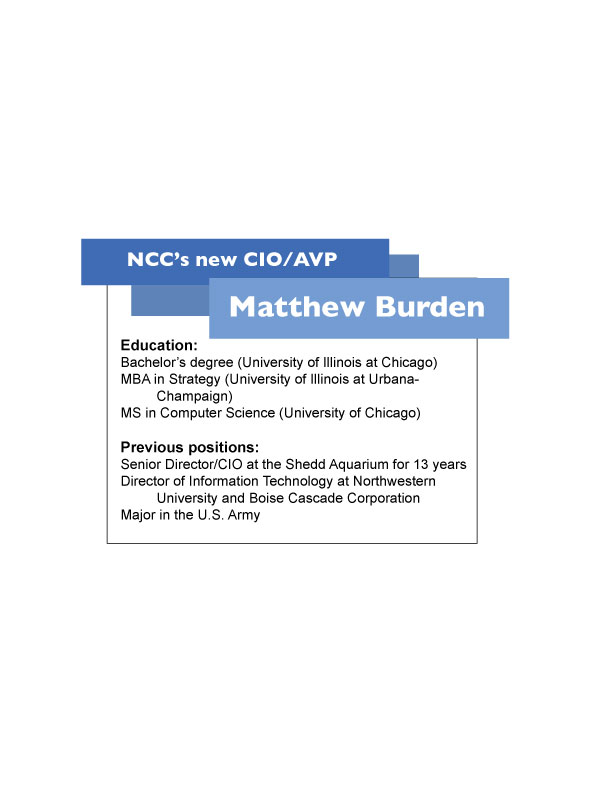By Amber Dvorak
North Central’s recently appointed candidate to fill the new Assistant Vice President/Chief Information Officer position began his role with the College May 20.
Matthew Burden, former senior director and Chief Information Officer at the Shedd Aquarium, was selected by a campus search committee over the course of the past several months. In this new position, Burden will provide an “institutional-level perspective on what information’s role is at the College,” said Mike Quintero, database communications and network systems analyst with ITS. “(It’s) not really about technology, but about information and how information can be used to benefit the College.”
The CIO position is a replacement for the Chief Technology Officer position previously held by Kathy Wilders, who left the College in December.
“Dr. (Troy) Hammond was very influential in identifying what his vision is for this” and promoted expanding this position into a larger role, said Paul Loscheider, vice president of Business Affairs.
As Quintero explained, “For the College to hit the next level of technology usage, we needed to have a more strategic perspective.” The CIO will collaborate and integrate practices with faculty and staff, determining their individual needs for technology in the classroom and finding ways to address them.
“We need to take a broader view of technology,” Loscheider said. He explained that Burden will look at the College’s current
infrastructure and determine what needs to be attended to. Some possible issues Burden may look at include whether another step should be taken on wireless usage, whether classroom technology is up to date, and whether North Central is using “the right email system.”
Since Burden will be reaching out to different faculty groups and individuals, he will be able to get a sense of their concerns about how to implement technology in the classroom, including the knowledge of how to operate it. “(The College has) spent millions on hardware and software,” said Loscheider, “and a disproportionate amount on training.”
There were two main qualities the search committee had been looking for in the CIO candidate, said Brian Hoffert, associateprofessor of religious studies and history and co-chair of the AVP/CIO search committee. These qualities were “leadership and vision of how IT will function.” The ideal candidate would “be able to work with various components of the College in a very visionary kind of way,” Hoffert said.
The call for a CIO went out at the end of winter term, and many applications had been received by March. The goal was to name a CIO by May 1, Hoffert said, and the College received approximately 200 applications.
The other co-chair of the committee, Michelle Skinder, prescreened the candidates into three groups based on who the College would be most interested in pursuing further, Hoffert explained.
Eight candidates were selected to have phone interviews that lasted approximately 45 minutes to an hour. This pool was narrowed down to four individuals – one of whom dropped out – who were brought onto campus and taken out to dinner by various members of the committee. This allowed the committee to “get a sense of who they are” and “talk in a low-key kind of way,” Hoffert said. “The campus interview process was very thorough.”
Campus meetings with these final candidates were held in the spring and were open to faculty and staff members. Students, however, were not invited to these sessions in order maintain the candidates’ confidentiality, said Hoffert, as the College did not wish to reveal full names or occupations in case the candidates were currently employed elsewhere.
After the committee interviewed all three final candidates, Burden’s selection was a “pretty unanimous decision” based on his qualifications and prior experience, Loscheider said.
Quintero said, “(The CIO position) reflects an awareness by the College that technology is strategically important. (It’s) not an end in itself, it’s a tool, but a very valuable tool.”
He added that the position is another way for the College to “evolve its perspective on technology” since “as the importance of technology in people’s lives changes, the College’s perspective on it has to change.”
Specifically, North Central needs to know and prepare for the expectations that incoming students will have when they come to the College. Loscheider said he has received feedback from student teachers about the technology younger students are currently using in the classroom, and those things need to be taken into consideration.
One example of how North Central may be able to expand its technology usage in the future is in sharing faculty resources with other universities. For instance, for the Japanese and Chinese courses at North Central – which are not offered at that many other universities – the College could host webinars that allow other students access to North Central faculty. Conversely, the College could also draw on faculty resources not available on-campus at North Central, which would be attractive for incoming students looking to pursue fields the College doesn’t necessary specialize in, yet who want to remain local.
“(Burden) will be this great partner,” Hoffert said – a way to represent the faculty and staff and open “better lines of communication all around. I think we’re going to be moving on a good path for North Central.”

